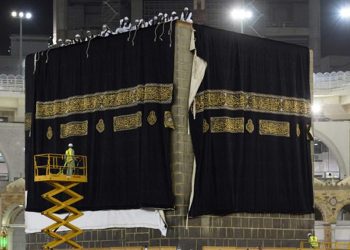RIYADH: The third phase of the Umrah pilgrimage for Muslims belonging to foreign countries is starting from today under strict SOPs to limit the spread of COVID-19.
Earlier, Saudi Arabia had announced resuming the Umrah pilgrimage for international pilgrims from November 1 after a suspension of months amid the COVID-19 pandemic.
As per details, the barricade placed around the Kaaba and the holy Black Stone will remain in its place and visitors will be prevented from touching them. Masjid al-Haram will be disinfected 10 times a day, while quarantine rooms have already been established for visitors having symptoms of COVID-19.
In wake of the Saudi government’s announcement to start the Umrah pilgrimage for international pilgrims, Pakistan announced it will accept applications for Umrah from the nationals from November 1 under the new regulations. Pakistanis will be able to submit their application for the Umrah pilgrimage under the new regulations.
Announcing the protocols for the resumption of International Umrah, Kingdom’s Hajj Ministry said that a negative PCR test no earlier than 72-hours before departure time in origin will be needed from the pilgrims while a quarantine period of three days must be completed in the hotel.
“Each group must be accompanied by a registered guide as no individual will be allowed to perform the Umrah,” it said while directing the pilgrims to arrive in the Kingdom with a registered group.
Earlier, the Kingdom of Saudi Arabia reopened the Muslim holy places for the Umrah pilgrimage. The Saudi government took the decision after implementing extensive health precautions and COVID-19 guidelines.
Meanwhile, the Saudi government intends to increase the number of pilgrims to 15,000 per day from October 18, while 40,000 people allowed to perform prayers at the mosque.
Visitors from abroad will be allowed from 1st November, when capacity will be raised to 20,000 pilgrims, with 60,000 people permitted into the mosque. The pilgrims are bound to get themselves register via a special application called ‘Amarna’.


































